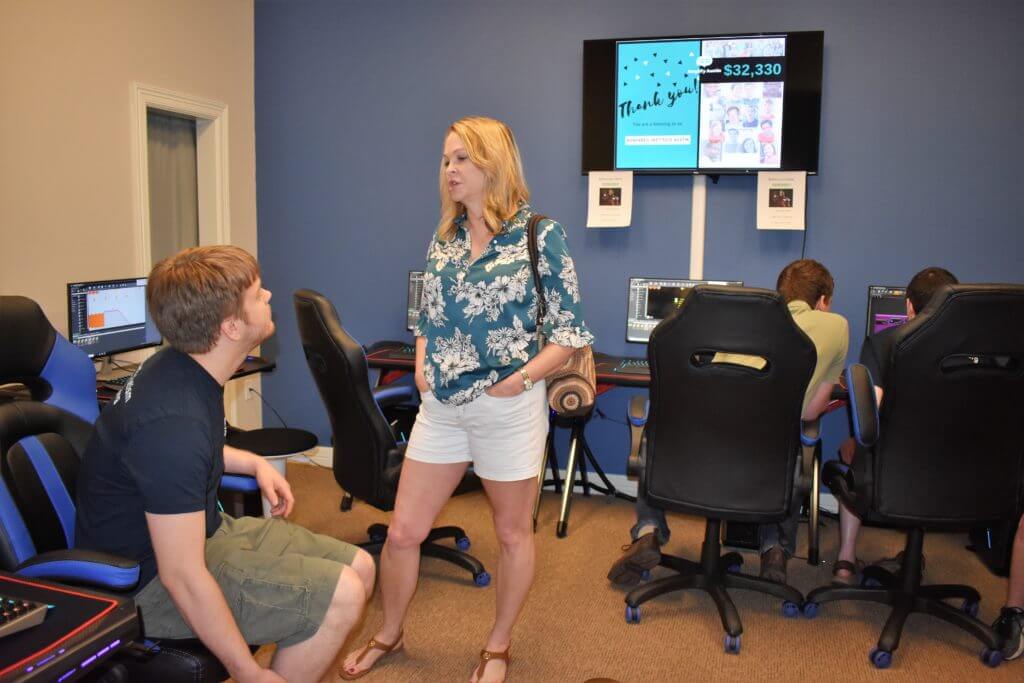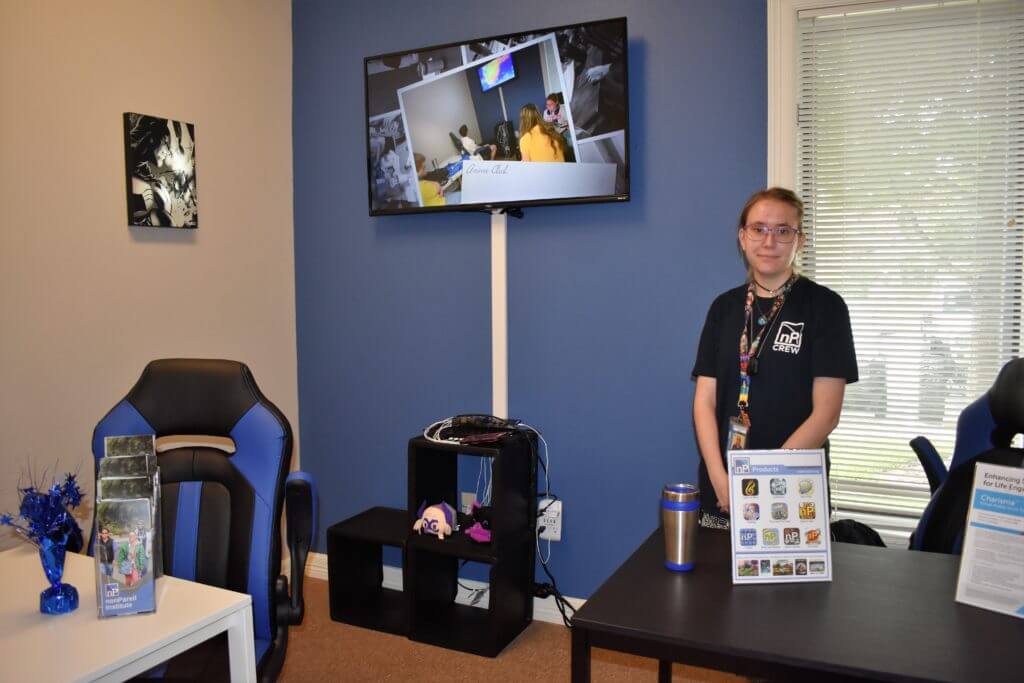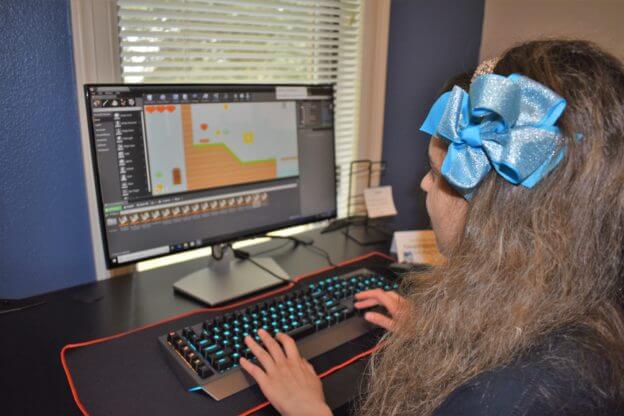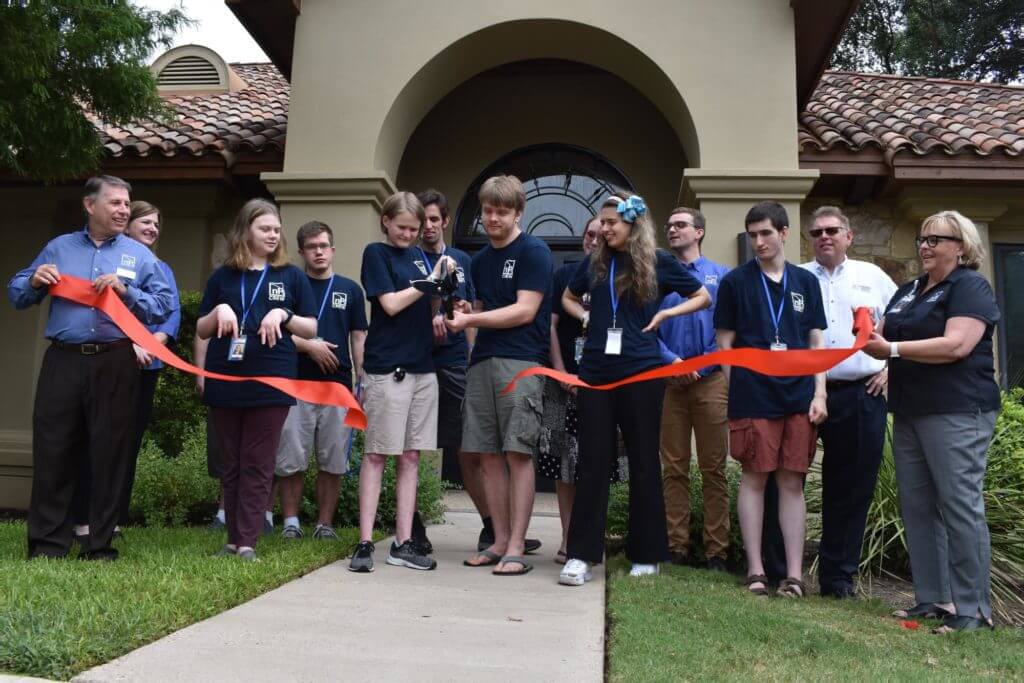
By LESLEE BASSMAN, Four Points News
Four Points resident Dale Thompson’s voice lifts with excitement as he talks about his son, Brent, who graduated from Vandegrift a few years ago. A four-year wrestler, Thompson said Brent attracted a lot of community interest during his high school years.
“He’s on the (autism) spectrum and yet Coach Cooper let him come on the team with zero experience,” Thompson said of Brent who was promoted to the varsity squad his junior and senior years. “Brent proved he was up to the challenge.”
Thompson said the family is indebted to Vandegrift for his son’s positive experience. But Brent’s story doesn’t end there.
He’s now a student, or “crew member,” at the nonPareil Institute that opened July 8 at 6618 Sitio Del Rio, Bldg. E, Ste. 102, at River Place.
A nonprofit, post-secondary program for adults with autism, nonPareil offers crew members technical training in digital art, 2D and 3D modeling, animation, 3D design, and programming as well as soft skills development such as communication, social connectivity, teamwork and self-advocacy, all while socially engaging with each other and instructors.
People with autism have the highest rate of unemployment among adults with disabilities, with 90 percent of those individuals with autism being underemployed or unemployed, said Kim Tagge, director of operations at Austin’s nonPareil facility.
Although individuals with autism are highly talented and very capable, she said the issue is “what happens when the bus stops coming,” meaning after high school graduation when district services end on their 21st birthday. Those students are capable of obtaining a degree from a higher education program but the school doesn’t necessarily fit their learning style, Tagge said.
And that’s where nonPareil comes in.
nonPareil
“We become that place (offering) learning and training in the digital area but in a way that’s very workforce ready,” Tagge said. “The ‘secret sauce’ to what we do is that we embed those important soft skills, or core skills, across every aspect of the curriculum.”
She said the students are referred to as “crew members” and the curriculum doesn’t include tests but instead “builds on projects and real world software development.” No classroom has more than six crew in it, Tagge said, with the Four Points facility anticipated to be maxed out at 60-75 crew members. She said she has about 100 prospective crew members on the institute’s wait list and is looking for the next program space which will remain in the Four Points area.
According to Tagge, crew members work in teams, develop portfolios and choose one of two digital tracks: design or art. Art includes modeling, animation, graphic design and 2D art, while design incorporates programming and world building, she said. The campus features industry standard tools for designing in Unreal Engine, a software program used by game developers to design and build games, simulations, and visualizations, Tagge said.
Typical jobs using these skills would be found in a gaming studio, corporate marketing department or architectural firm, she said. The draw for enrollees is the video game architecture atmosphere, Tagge said.
“Gaming is the hook,” she said. “All of those skills in video game development are in every other part of technology.”
The first session of training, or track, for the Austin campus began with an inaugural crew of 10 members and lasts 12 weeks, with four such tracks running annually, Tagge said. A new group of 10 crew members will enter the program when the current track ends in September, she said.
The Four Points site has three instructors and will hire two additional instructors for the campus soon, possibly adding two lab techs, Tagge said.
“It’s a calm environment, it’s meant to suit (crew members), it’s designed for them and they thrive,” she said.
Company history
The company was founded by president and CEO Gary Moore and Dan Sellick, both parents of sons with autism. The two shared their concerns about what life would be like for their children after the youngsters finished high school, Moore said. Sellick had the idea of starting a company to train adults with autism and named it “nonPareil” because it translates from French as ‘no parallel,’ ‘no equal,’ he said.
“And that’s kind of how we view our sons and daughters — they’re so awesome, they have no equal,” Moore said.
The organization started in Plano with eight crew members, a site that has grown to 150 crew members currently, he said. Austin is nonPareil’s fourth facility, with additional sites in Houston and Orlando.
Austin location
“Austin chose us,” Moore said of the 2019 opening. “Once we opened Houston about four years ago, I started getting a lot of calls from parents and families in Austin that had either come into Houston or Plano and really wanted a nonPareil in Austin.”
He said Austin had been on his radar for a long time because of its technology focus and the synergy between autism, technology and the region’s universities.
Development
“For many (crew members), they have talent and ability, they just need some time to grow and develop work-readiness skills, social skills, life skills, technical skills, before they can apply to the workforce,” Moore said. “And many of them, unfortunately, struggle going to college. So, we’re kind of that in-between, we’re more like a transition program. When they graduate high school, they’re not ready to go to college or enter the workforce.”
He said the goal at nonPareil is for crew members to learn a variety of technical, soft and communication skills — how to do a resume, how to work with others, how to meet deadlines, how to make goals, how to meet those goals — skills that “are going to help them whether they go on to college after they leave nonPareil or they enter the workforce.” They work at their own pace, Moore said, as opposed to a university during which final exams are given during specified weeks each semester or students who start college as freshmen and complete their studies in four years, graduating at the same time.
“That doesn’t work for (students with) autism,” he said. “They need to work at a different pace, some go faster and some go slower. We try to tailor (the program) to the person instead of making everybody follow at the same speed—it’s because they just can’t.”
The facility charges tuition but receives funding from donations through community endeavors and foundations, Moore said, adding the average time spent by crew members on the campus is two to three years. The minimum age for enrollment is 18 years old and crew members must have completed high school to be admitted, he said.
Thompson, a retired technology executive, spearheaded efforts to bring in state-of-the-art technical equipment to the Four Points program that was donated by computer manufacturer Dell, and its subsidiary Alienware, a computer hardware company, and Intel Corp., a semiconductor manufacturing company. A gaming company contributed the modular furniture on the campus.
Thompson said there are few resources available to young adults on the spectrum post-high school and additional nonPareil programs are needed across the country.
“Hopefully, we can point to this (Four Points site) and raise more funds to open up additional campuses,” Thompson said, adding he’s challenging local technology companies Microsoft and AMD to ante up in “a friendly competition” to support the program.
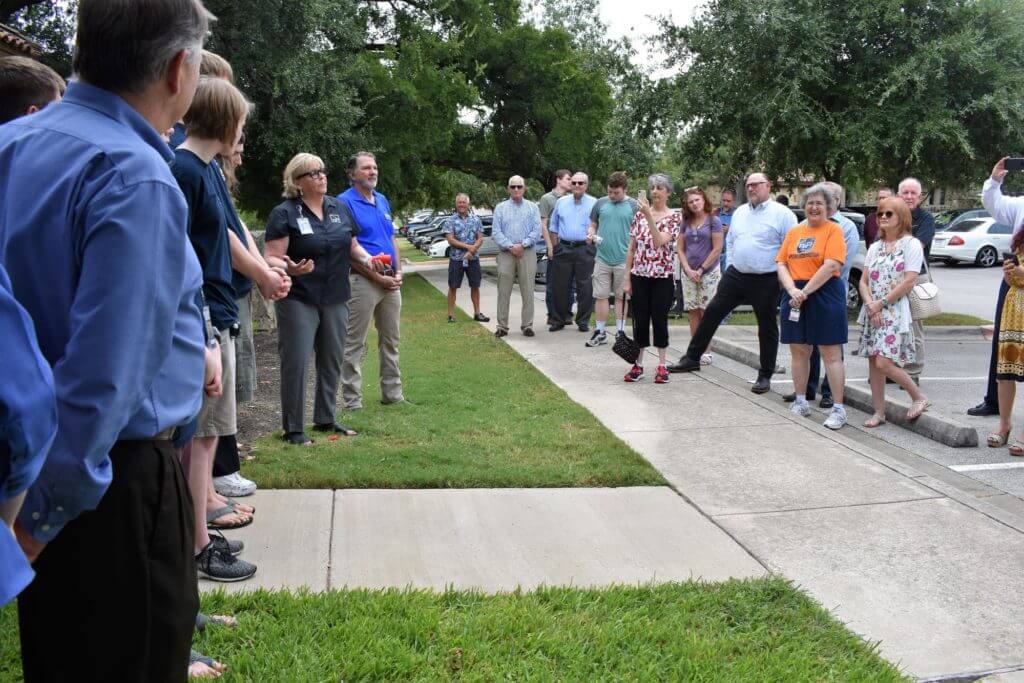
nonPareil making a difference for families
nonPareil Institute board member Larry Warnock said his son Travis, an adult with autism, didn’t have a clear path for what he was going to do next after he graduated from high school. Junior college wasn’t appropriate for him and posed too much pressure, Warnock said. A two-year life skills program in Tucson offered Travis the opportunity to learn life skills and live independently but lacked “a career path or education that could set him up for long-term employment,” he said.
Following a search across the U.S., Warnock said he found nonPareil in Plano and put his son in an apartment there so he could attend the program. Warnock assisted local efforts to get the Austin site off the ground once the organization’s executives made the decision to open the new facility. The local program now counts Travis as a crew member and the Westlake High School graduate is comfortably settled into a Four Points apartment.
“(nonPareil) gives Travis purpose and that’s the most valuable thing nonPareil provides people,” Warnock said. “Yes, it’s training, yes it’s the feeling of self worth because they create games. But Travis was just floating, he had no direction, he had no purpose. And everyone around him was going to Stanford, UT or A&M, Notre Dame. He didn’t have a path.”
Warnock, the CEO of Olono software company, is working with local SailPoint Technologies for the Four Points-based company to sponsor a classroom at the facility as well as enable crew members to visit their headquarters to see real-world applications for their futures.
According to Warnock, “the tech community has a high percentage of autistic workers.”
“I’m a big believer that there are jobs in the local tech community that these individuals can do,” he said.
Like Warnock, Westlake parent Glenn Sutton, began exploring post-graduate options for son Chase — who also is on the spectrum — when he was a high school junior. Once Sutton connected with nonPareil Institute founder Gary Moore, he said he was hooked on the program.
Although Chase, age 21, is currently attending the University of Arkansas and part of the college’s autism support program, Sutton said he hopes his son will one day become a crewmember or volunteer in the program
.
“Not only does (nonPareil) give them training and a way to develop a passion, that’s kind of key, but I think the biggest thing is community,” he said. “Sometimes it’s a very lonely life being a kid on the (autism) spectrum. It’s tough to initiate friendships. You feel left out in the world.”
Sutton said he has seen friendships develop at nonPareil and the institute serves as a place for adults with autism to work and interact with others on a daily basis instead of being secluded in their rooms at home, working on the computer or watching television.
“Hopefully, a lot more folks here in Austin and West Austin will be able to come up and tour the facilities and see what a great opportunity it is for a great part of our population that’s underserved,” Sutton said.
